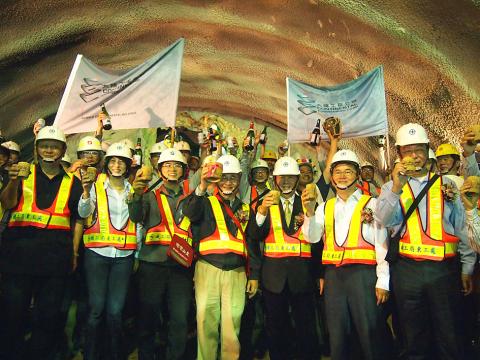The completion of the Shanli Tunnel (山里隧道), scheduled for the end of this year, will pave the way for electrification of the entire Eastern Line and direct trains all the way to Taitung, the Railway Reconstruction Bureau said yesterday.
The 5.3km tunnel between Hualien and Taitung is the longest on the modified route.
At present, passengers traveling from Taipei to Taitung must switch to a diesel-powered train at Hualien halfway through their journey.

Photo: Wang Hsiu-ting, Taipei Times
The bureau hosted a ceremony yesterday celebrating the completion of the tunnel drilling. Workers operating an excavator broke through the rock separating the north and south ends of the tunnel.
Bureau Director-General Jack Hsu (許俊逸) said construction of the tunnel was initially scheduled to be completed by June next year.
Completion ahead of schedule was even more remarkable as construction was interrupted six times in its initial stage because of typhoons and heavy rain, the bureau said.
However, with the drilling completed, workers can now begin laying the tracks and installing the electrical equipment, which could be completed by the end of this year, Hsu said.
“The Shanli Tunnel is the most crucial part of the project [to electrify the Hualien-Taitung line],” Hsu said, adding that the drilling took about two years.
Minister of Transportation and Communications Mao Chi-kuo (毛治國) said the ministry was confident the 155km-long electrified Hualien-Taitung line would become operational next year, adding that the new route would reduce the travel time from Taipei to Taitung to about three-and-a-half hours from about five-and-a-half hours.
The ministry’s next project is the South-Link Line connecting Taitung with Greater Kaohsiung, which has yet to be electrified, Mao said.
Work on the project could begin next year, he said.
Mao said the bureau had also started planning the construction of a direct railway route between Taipei and Yilan, which would depart from Nangang Railway Station in Taipei and go to Jiaosi Township (礁溪), Yilan County.
“If the Taipei-Yilan direct line is complete, it could further decrease travel time between Taipei and Taitung to three hours if the train only stops in Yilan and Hualien,” he said. “And when the South-Link Line is electrified, people from the West Coast will be able to take the high-speed rail and switch to the South-Link Line to travel to Taitung, which would also take about three hours. So whether you went along the east coast or the west coast, it would only take about three hours to arrive in Taitung.”
Despite improvements in the railway service, Mao said the ministry still needed to address several issues before it could truly improve transportation along the east coast.
“We need to consider how to properly increase train services during holidays, particularly when there are large events, like the [Taiwan International] Hot Air Balloon Festival [in Taitung County],” he said. “With an increase in train services, we might run short of train carriages and conductors as well.”
Mao suggested that airlines could have additional flights during peak periods.
Apart from the Shanli Tunnel, the Hualien-Taitung line has three further constructionally challenging tunnels on its modified route, including the Guangfu (光復), Zihciang (自強) and Sikou (溪口) tunnels.

Chinese Nationalist Party (KMT) Chairman Eric Chu (朱立倫), spokeswoman Yang Chih-yu (楊智伃) and Legislator Hsieh Lung-chieh (謝龍介) would be summoned by police for questioning for leading an illegal assembly on Thursday evening last week, Minister of the Interior Liu Shyh-fang (劉世芳) said today. The three KMT officials led an assembly outside the Taipei City Prosecutors’ Office, a restricted area where public assembly is not allowed, protesting the questioning of several KMT staff and searches of KMT headquarters and offices in a recall petition forgery case. Chu, Yang and Hsieh are all suspected of contravening the Assembly and Parade Act (集會遊行法) by holding

PRAISE: Japanese visitor Takashi Kubota said the Taiwanese temple architecture images showcased in the AI Art Gallery were the most impressive displays he saw Taiwan does not have an official pavilion at the World Expo in Osaka, Japan, because of its diplomatic predicament, but the government-backed Tech World pavilion is drawing interest with its unique recreations of works by Taiwanese artists. The pavilion features an artificial intelligence (AI)-based art gallery showcasing works of famous Taiwanese artists from the Japanese colonial period using innovative technologies. Among its main simulated displays are Eastern gouache paintings by Chen Chin (陳進), Lin Yu-shan (林玉山) and Kuo Hsueh-hu (郭雪湖), who were the three young Taiwanese painters selected for the East Asian Painting exhibition in 1927. Gouache is a water-based

Taiwan would welcome the return of Honduras as a diplomatic ally if its next president decides to make such a move, Minister of Foreign Affairs Lin Chia-lung (林佳龍) said yesterday. “Of course, we would welcome Honduras if they want to restore diplomatic ties with Taiwan after their elections,” Lin said at a meeting of the legislature’s Foreign Affairs and National Defense Committee, when asked to comment on statements made by two of the three Honduran presidential candidates during the presidential campaign in the Central American country. Taiwan is paying close attention to the region as a whole in the wake of a

OFF-TARGET: More than 30,000 participants were expected to take part in the Games next month, but only 6,550 foreign and 19,400 Taiwanese athletes have registered Taipei city councilors yesterday blasted the organizers of next month’s World Masters Games over sudden timetable and venue changes, which they said have caused thousands of participants to back out of the international sporting event, among other organizational issues. They also cited visa delays and political interference by China as reasons many foreign athletes are requesting refunds for the event, to be held from May 17 to 30. Jointly organized by the Taipei and New Taipei City governments, the games have been rocked by numerous controversies since preparations began in 2020. Taipei City Councilor Lin Yen-feng (林延鳳) said yesterday that new measures by